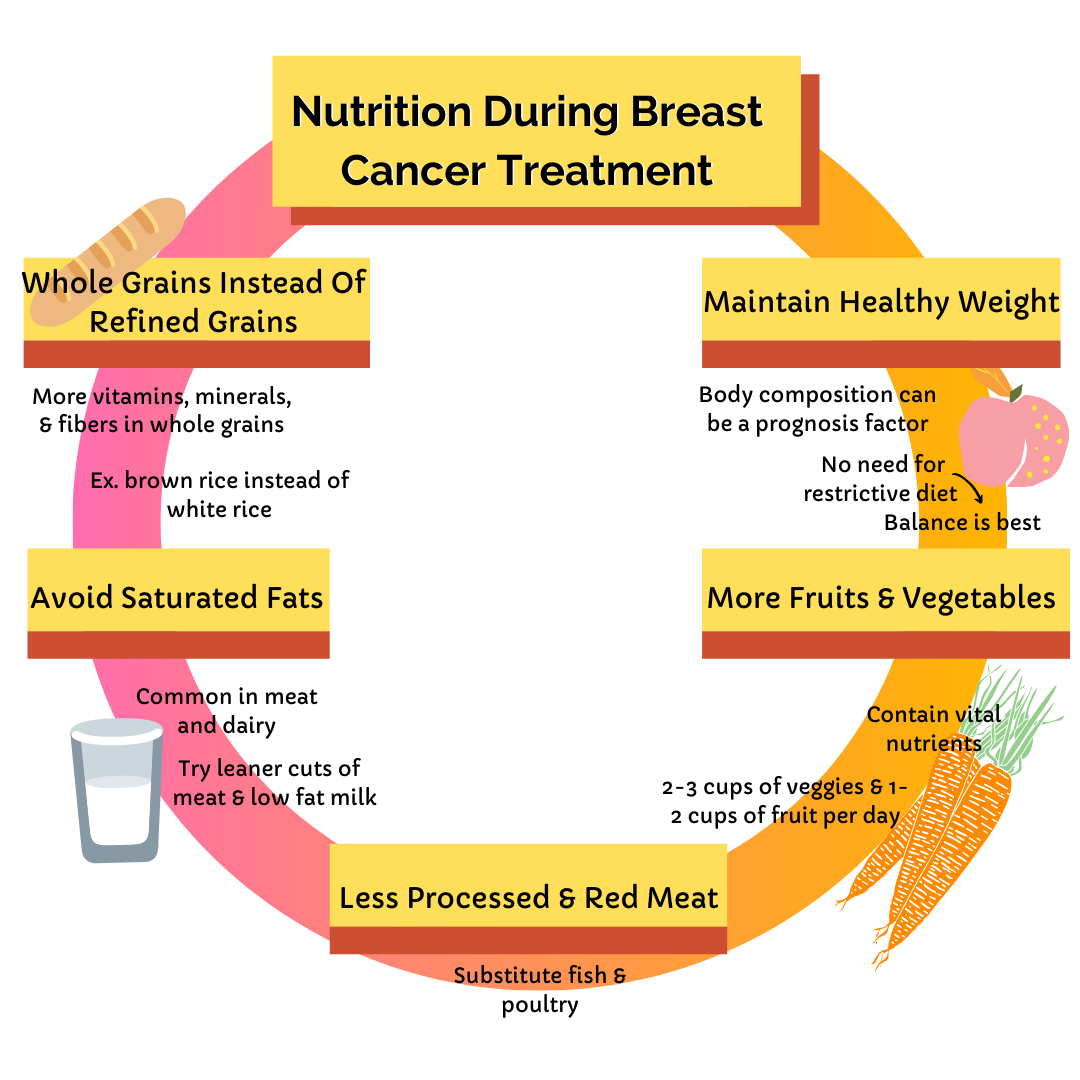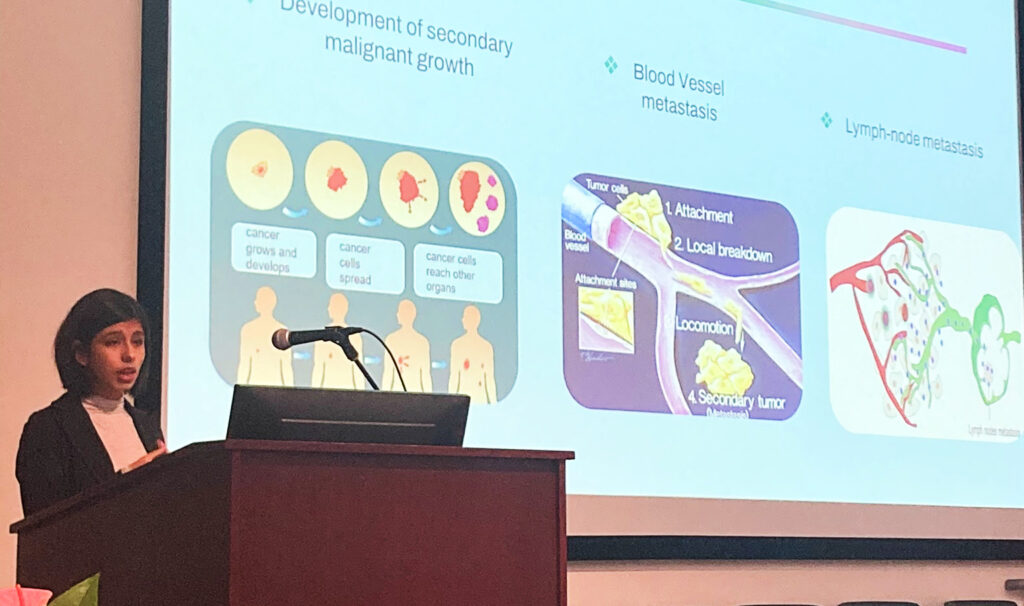Like any major diagnosis, breast cancer brings lifestyle changes. Overall health and well-being can become important elements of a treatment plan. For those undergoing cancer treatment, Cleveland Clinic nutritionist Anna Taylor says you can follow a generally healthy diet as long as you don’t have nutrition-related side effects. Pieces of the puzzle that make up a person’s health can vary, but there are a few things that remain constant for everyone. In addition to exercise, stress management, and sleep, good nutrition can play a big part in maintaining a healthy lifestyle.
Whether you’re in remission, undergoing treatment, or just looking to be healthier in the new year, here are a few tips to improve your diet! As always, be sure to consult with your physician before beginning a new wellness regiment.
1. Substitute Whole Grains for Refined Grains
Refined grains, like white grain and white bread, have been through the milling process. This leaves lower levels of vitamins, minerals, and fibers than whole grains. It is recommended that at least half the grains you eat are whole grains.
Switching from white to brown rice can be one easy switch to help incorporate more whole rather than refined grains. Popcorn is also a whole grain food — air-popped popcorn can be a great, low-calorie snack! Other grains like barley and millet can be great additions to round out your nutrition. Personally, I love this recipe for chocolate breakfast quinoa!
2. Limit Intake of Processed and Red meat
The American Cancer Society guidelines on nutrition and physical activity state that several studies have linked eating large amounts of red and processed meat to increased risk of colorectal, prostate, and stomach cancers. The guidelines also suggest that “cancer survivors may also want to follow this recommendation for general good health.”
Fish and poultry are options to substitute into your diet. Eggs, beans, soy products, and nuts can be good substitutes to avoid meat entirely. They’re also good sources of protein. Another option to go meatless is plant-based meat substitutes, which have gained popularity and are available in most grocery stores. These chicken-less nuggets are my personal favorites to pick up at my local Aldi, and this recipe for veggie burgers is insanely easy and delicious if you’re more of a home chef.
3. Increase the Intake of Fruits and Vegetables
Current research indicates that the average adult should eat between 2-3 cups of vegetables and between 1.5-2 cups of fruit per day. The nutrients found in fruits and vegetables are vital to the body’s proper functionality. In addition to being naturally low in fats and cholesterol, the risk of chronic illness can be reduced. Also, the “organic” label doesn’t automatically mean it’s better — there’s no scientific evidence to indicate the nutritional content of organic vegetables is better than any other produce.
There are a lot of different kinds of fruits and vegetables. That leaves a lot of room for you to experiment, figure out what you like best, and have fun with your nutrition. Cruciferous veggies like broccoli, cauliflower, and brussel sprouts contain high levels of phytochemicals thought to fight cancer. If you’re a fan of Asian flavors like I am, sauteed broccoli and spaghetti squash pad thai are delicious ways to add more veggies into your day.

4. Avoid Saturated Fats
Technically speaking, saturated fats are fat molecules that have no double carbon bonds because they’re saturated with hydrogen bonds. Translation: they’re typically solid at room temperature. Saturated fats are most commonly found in meat and dairy products. There is evidence that saturated fats may have an effect on increasing cancer risk. Excess saturated fats is also a known risk factor for cardiovascular diseases.
There are a few substitutions and workarounds to avoid too much saturated fat in your diet. Opt for leaner cuts of meat and bake, broil, or grill instead of frying. Use fat-free, reduced-fat milk, or plant milk and try substituting nonfat plain yogurt for cream cheese. You can also substitute apple sauce to decrease the amount of butter used for baking. If you’re looking for dinner inspiration, this healthy fish & chips recipe is a great, low-fat, protein-rich meal!
5. Maintain a Healthy Weight
As stated by the American Cancer Society, achieving and maintaining a healthy weight is one of “the most important lifestyle pursuits” for women with breast cancer. The majority of studies over the past several decades indicate that being overweight or obese at the time of diagnosis can indicate a less favorable outcome. Therefore it’s important, especially for breast cancer patients, to have a balanced lifestyle with regular exercise and good nutrition.
There’s no need to panic and start a strict diet. According to Sarah Halter, M.D., a family health specialist at UW Neighborhood Factoria Clinic, “dieting is…going against the way your body is wired.” It’s usually better to stick to a more balanced diet and have a mindful relationship with your body and the food you eat. For example, you can still eat dessert with these zucchini brownies that are half the calories of regular brownies! The changes you make to your diet don’t have to be drastic, and you can still have the flavors you enjoy.
Of course, these aren’t the only five ways to be a little healthier in your daily life. Feel free to experiment and try new things. It’s your body — do what’s right for you!
Side-Out’s blog posts are intended for informational purposes only and contain no official medical advice. Please view our full disclaimer.




